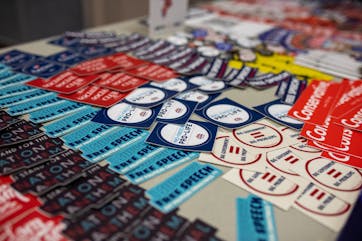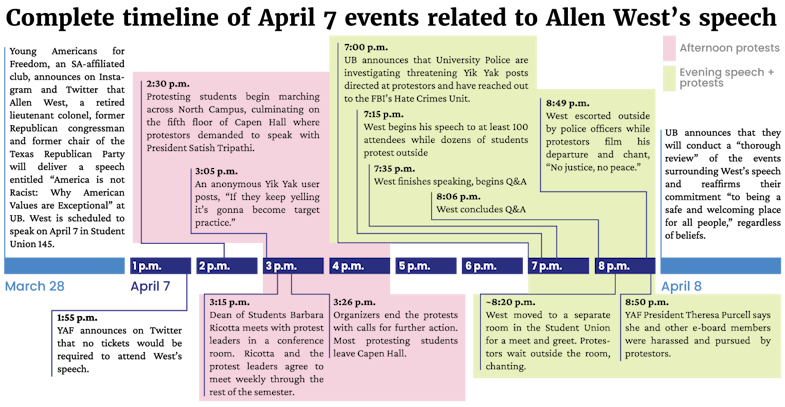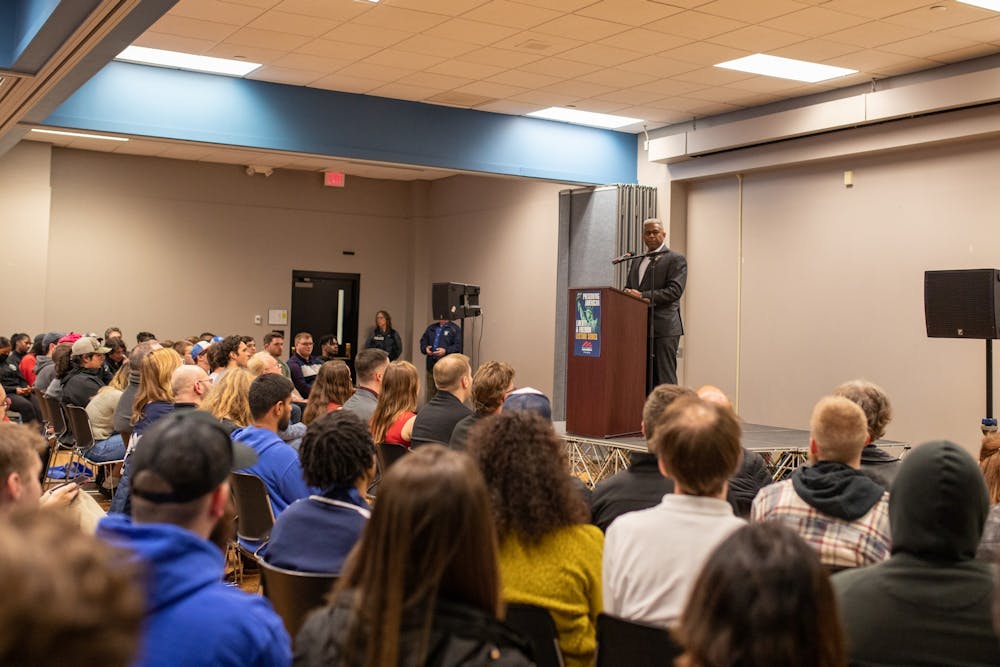The normally still hallways of UB’s North Campus were transformed into a battleground of competing ideologies Thursday, as students attended and protested Lt. Col. Allen West’s speech in the Student Union.
West, a former Congressman from Florida and Texas gubernatorial candidate, delivered a speech titled “America is not racist” in Student Union 145 at 7 p.m. Thursday. The speech, which was organized by the UB chapter of Young Americans for Freedom, ignited controversy and a spirited discussion — both inside and outside of the room.
Tension could be felt inside the room even before West took the stage. The venue was filled with a foreboding buzz, as if participants expected something bad to happen.
In a nod to the firestorm surrounding his speech, West centered his talk around American exceptionalism and self-reliance through the lens of his own personal experiences.
“I know that there has been a little kerfuffle that’s been going on on this campus, but you’re looking at a young man who in 1961 was born in a Blacks-only hospital in Atlanta. Look it up,” West said.
Drawing from his family history in the segregated South, West crafted a narrative extolling the importance of the “golden ring” of exceptionalism the U.S. affords to its citizens. He highlighted the military achievements of Black men like James Armistead Lafayette and pulled quotes from Booker T. Washington’s “Up From Slavery” to encourage the audience to read deeper into U.S. history.
“If you fail to learn from history, you end up finding yourselves being led around as a mindless lemming,” West said of the country’s history. “I’m not sitting up here and trying to apologize for the past in America. But I will tell you this — if you sit around and you believe that America was founded in 1619” — the year that the first enslaved Africans were brought to Virginia — “then you take away the story of a man who was the first person killed in the fight for freedom and liberty in the U.S.”
West also flaunted his political connections, which included events at Mar-a-Lago with then-future-President Donald Trump and three one-on-one dinners with the late conservative political commentator Rush Limbaugh.
His speech lasted roughly 35 minutes, and was followed by an increasingly chaotic Q&A session.
Some students complained that West’s speech didn’t acknowledge the major issues facing the Black community.
“We should have more open dialogue,” one student said. “We should stop talking about exceptionalism because then we can’t be criticized. That’s the whole point, right?”
Another student touched on their personal experiences navigating the educational system as a person of color.

“It’s really embarrassing that you [Allen West] had the audacity to come here, validate the opinions of all these people and ignore the fact that there are literally Black students here who have to fight for their right to be on this campus every single day — it’s embarrassing,” that student said.
After multiple contentious exchanges, event organizers decided to limit each person to one question and had moderators hold the microphone — not participants. West says he has had this experience at each of his previous 15 stops on his YAF speaking tour.
Connor Ogrydziak, vice president of UB’s YAF chapter, says he wishes students were more respectful during the Q&A session.
“I felt like instead of letting him answer the questions, people just chose to speak over them instead and that’s not how we make any sort of progress,” Ogrydziak said. “You need to be open to discourse, not have crowds speak over each other.”
West himself encourages open discourse on college campuses across the nation.
“The reason I come to universities is because we’ve got to have diversity of thought,” West told The Spectrum after the event. “It cannot be just one message because when college becomes a one-way street, that’s when we lose ourselves.”
Before the event, Dean of Students Barbara Ricotta spoke to the audience about showing respect for the speaker.
“Before we begin tonight’s program, the university would like to share a brief video on freedom of expression here at UB,” Ricotta said prior to West’s talk.
The video included statements from Vice Provost for Academic Affairs A. Scott Weber and a number of students, all of whom encouraged participants to “allow diverse points of view to be expressed and heard.”
Once the video ended, Ricotta said: “As you saw in the video, the university highly values freedom of expression. We expect you to be respectful of tonight’s speaker. If you disrupt tonight’s program, you’ll be approached by a staff member. If you continue to be disruptive, you’ll be asked to leave.”
But the controversy began even before the event, when students waiting to get in complained of discriminatory treatment.
Smitty Smith, a junior history major, says entrance priority was given to some students over others.
“I’ve been in line since 6:11 p.m. and when I got here there were about six people in front of me,” Smith said. “The lady who was in charge of the event addressed the three caucasians in front of all the African American people and then skipped all the African American people… she pulled [people] from behind the line in front of us.”
Therese Purcell, the president of the UB chapter of YAF, characterized that depiction as “grossly inaccurate.”

“I have a lot of sources to prove that it [that account] was not true,” Purcell, who claims she “feared for her life” when she was chased by protestors, said. “That had absolutely nothing to do with race when we were admitting people into the event: we had a ticketed line and a standby line.”
Students protested West’s speech throughout the day Thursday. At 2 p.m., students organized a walkout in support of anti-racist measures. At least 100 students attended these protests, which spanned the Academic Spine and spilled into classrooms and libraries.
Dozens of copycat posters protesting the speech lined campus in the days leading up to the event. Purcell says “at least” 500 YAF posters promoting West’s speech were torn down.
“We see them in the trash all over campus, which we find to be really unfortunate as college campuses are supposed to be a place for dialogue and freedom of speech,” Purcell said. “I think definitely the student body seems to have a lot more of a left-leaning bend, just as you can see, by the lack of tolerance toward our event.”
Ogrydziak says he thinks the speech was important because it brought a different perspective to campus.
“I think everything was pretty well-communicated,” Ogrydziak said. “I thought the message was mostly received, whether everyone wanted to accept it or not.”
Jack Porcari is a senior news/features editor and can be reached at jack.porcari@ubspectrum.com

Jack Porcari is a senior news/features editor at The Spectrum. He is a political science major with a minor in journalism. Aside from writing and editing, he enjoys playing piano, flow arts, reptiles and activism.





